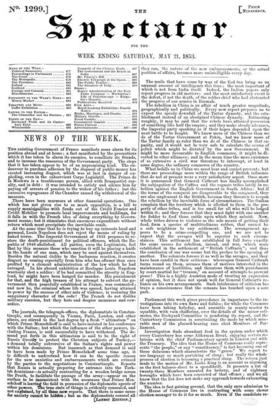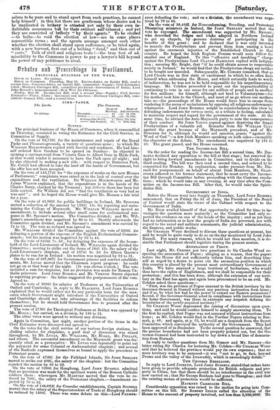Parliament this week gives precedence in importance to the in-
vestigations into its own flaws and foibles ; for while the Commons have been taking holyday, and assemble in scanty muster to squabble, with vain chaffering, over the details of the minor esti- mates, the Dockyard Committee is pondering its report, and the Canterbury Commission is scrutinizing the mode by which mise- rable men of the placard-bearing race elect Members of Par- liament.
Investigation finds abundant food in the system under which every Canterbury has some Alderman Brent, enjoying certain re- lations with the chief Parliamentary agents in London and with the Treasury. The idea that the House of Commons really repre- sents "the people," or any "constituency," is fast becoming one of those delusions which characterize the "green." We regret to use language so much partakinr, of slang ; but really the whole process of election is becoming a practical slang. The return just made to the motion of Mr. Locke Sing is an account as alarming as the first balance-sheet to a spendthrift. It presents a list of twenty-three Members unseated for bribery, and of eighteen boroughs which have been convicted of that offence • and we all know that the list does not make any approach towards exhausting the number. The idea is fast gaining ground, that the only sure admission to the House of Commons lies in contracting with some clever election-manager to do it for so much. Even if the candidate re- solves to be pure and to stand apart from such practices, he cannot help himself: in this list there are gentlemen whose desire not to be implicated in bribery is attested not• only by their own in- dubitable assurances bug by the& evident self-interest ; and yet they are convicted of bribery "by their agents." To be eleeted —to bribe—to void the election at law—are in some places convertible terms ; and the agents arrange amongst each other whether the election shall stand upon sufferance, or be tried again, with a new harvest, first out of a bribing" fund," and then out of "costs." Talk of civil and religious tests !—the true test of ad- missibility to the Commons is power to pay a lawyer's bill beyond the power of any petitioner to rival.



























